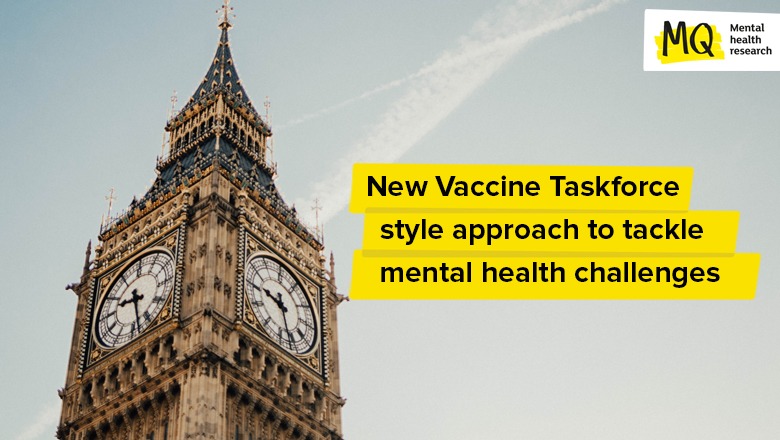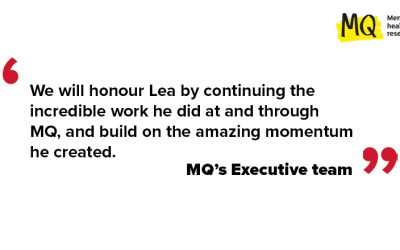The UK Government has announced a new ‘Vaccine Taskforce style approach’ to tackle a range of health challenges, including mental health.
The government has today announced over £113 million to fund research into 4 healthcare missions – cancer, obesity, mental health and addiction – to unlock the next generation of medicines and diagnostics to save lives, transform patient care and ensure UK patients are the first to benefit from medical breakthroughs.
The mental health mission will receive over £40 million in funding for mental health research, particularly into the use of digital technologies as interventions for mental illnesses.
MQ’s CEO Lea Milligan has been involved in the planning of the mental health mission, and MQ is a key stakeholder in the project.
“This new investment into some of the countries greatest health challenges is precisely what’s needed to ensure the most vulnerable in society are supported. My hope is that this targeted investment into Mental Health Research puts the voice of people with lived experience of mental health at the core, catalyses partnership with new industries and technologies and ultimately gets new evidence led interventions into the hands of the frontline services and NHS staff. I am deeply encouraged by the work OLS has done to listen to people from across the spectrum of mental health research and the public; responding with a focused and timely investment to transform the future of mental health through research.”
Lea Milligan, CEO of MQ Mental Health Research
Building on the Vaccine Taskforce model the government will continue to harness world-leading research expertise, remove unnecessary bureaucracy, strengthen partnerships and support the new healthcare challenges.
In addition, tackling these healthcare challenges could save the NHS and the economy billions of pounds – it is estimated poor mental health costs the economy £118 billion a year.
The Prime Minister, Health and Social Care Secretary and Business Secretary will today meet with key industry figures, including global CEOs, NHS leaders and industry experts at the Life Sciences Council to discuss how their support will deliver life-changing innovations to patients, boost NHS efficiency and ensure the UK remains a global life sciences superpower.
The Prime Minister, Rishi Sunak, said:
“The NHS faces real pressures, which is why we are investing over £100 million in the technologies and medicines of the future to address some of the biggest public health challenges facing our country.
This funding will improve outcomes for patients, ease existing pressures on the system and ensure that we are among the first to benefit from medical breakthroughs. Importantly it will also help save the NHS millions of pounds that could otherwise be spent on patient care – for example by tackling obesity which costs the health service over £6 billion annually.
It is hugely welcome too that the highly successful Vaccine Taskforce, which procured millions of life-saving vaccines in record time during the pandemic, will now become a blueprint for how we harness the best talent and expertise from around the world and drive investment in research and development.”
The research will focus on the top public health priorities, as identified by the NHS:
- mental health: £40.2 million for research into mental health to develop and introduce digital technologies to support patients. This could include technology allowing patients to monitor their mental health at home and instantly report to their doctor if in need of help. Funding will be spent in the Midlands and the North to bolster services and ensure people across the UK can access support, helping level up health across the country. With one in 4 adults experiencing mental illness, poor mental health costs the economy £118 billion a year
- cancer: £22.5 million will go into cancer research to develop new immune-based cancer therapies, including cancer vaccines, which are targeted to a patient’s specific cancer. Funding will also support the development of technologies that enable earlier, more effective cancer diagnosis. This will support progress towards the NHS Long Term Plan ambition to diagnose three-quarters of cancers at stages 1 or 2 by 2028
- obesity: £20 million to trial how best to deliver new medicines and technologies for people living with obesity, particularly in deprived communities across the UK. This will help new medicines coming to market – some of which have the potential to reduce a person’s weight by more than 20% – to better support people to achieve a healthy weight. The mission will explore how these medicines can be combined with cutting-edge technologies and digital tools to improve long-term health outcomes. Obesity costs the NHS £6.1 billion a year and helping people lose weight and lead healthier lifestyles could lead to significant savings
- addiction: £30.5 million, including funds contributed through collaboration with Scottish Government, will be deployed to accelerate the development of new technologies to prevent deaths from overdoses across the UK. This could include wearable devices which can detect the onset of a drug overdose and signal to first responders to prevent deaths, and better support people with substance use disorders to manage and combat their addiction. Funding will also help grow research capacity and capability across the UK to better understand addiction and the most effective ways to treat it as a chronic healthcare condition
“The OLS investment into the Mental Health Mission is potentially game-changing. Bringing innovative, evidence-based technologies to bear on the challenges faced by people with mental ill-health requires significant and sophisticated research infrastructure and strong partnerships between industry, universities and the NHS. While these already exist in pockets around the UK, the scale of the Mission and its autonomy will accelerate progress in an area where the need is on a global scale.”
Professor Peter Jones, Professor of Psychiatry, Cambridge University and Chair of MQ’s Science Council
In line with the Vaccines Taskforce, the 4 healthcare missions will be led by an independent chair – an expert in that field – to accelerate the development and introduction of the latest treatments and technology into the NHS, as well as drive collaboration across partners. This will not only ensure better care for patients, but also improve the accuracy of diagnosis and free up clinician time, helping tackle the COVID-19 backlog and ease pressure on health services.
“This solutions focused approach from the OLS is very encouraging. Historically only 3.9% of mental health research funding has been focused on preventions so I am very pleased that the mental health mission will be focusing on using technology to prevent symptoms as well as finding innovative new treatments to transform lives.”
Dr. Shahzad Malik, Chair of MQ Mental Health Research and General Partner, Advent Life Sciences
This announcement has not only been welcomed by research charities, including MQ, but also the many people who have been impacted by mental illness who are frustrated by a lack of investment in the area.
“The new Mental Health Mission is very exciting. What we need now, more than ever before, is solutions for the 1 in 4 of us who are impacted by mental illness. I’m really pleased to see a focus on children and young peoples mental health and on how we can use technology to manage and prevent symptoms. It feels like we are edging ever closer into the golden age of mental health research and I am excited to see what this new initiative can bring.”
Asha Iqbal, Mental health Campaigner and founder of Generation Reform.



